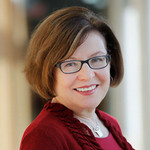Highlights from "American Jewishness Today: Identity and Transmissibility in an Open World"
Dec. 19, 2014
By Sylvia Barack Fishman
Editor’s note: Professor Sylvia Barack Fishman, HBI co-director and the Joseph and Esther Foster Professor of Contemporary Jewish Life, delivered the Marshall Sklare Memorial Lecture at the annual Conference of the Association for Jewish Studies, this year. Here are some of the highlights of her talk.
In my talk, "American Jewishness Today: Identity and Transmissibility in an Open World," I discussed three challenges to Jewish family formation: late marriage and non-marriage; unwanted low fertility and infertility, and mixed marriage. Each of these is produced in part by the larger society's social norms and is deeply influenced by American culture. And each of these challenges in turn has a profound effect on the transmission of Jewish culture to the next generations.
Many American Jews experience Jewishness primarily within families and friendship circles, so it is critical to understand Jewish family formation and the disruptions that have changed family format for Americans and American Jews.
On a positive note concerning the formation of Jewish families, Jewish partnership marriages are flourishing; "partnership marriages" are marriages in which heterosexual or homosexual spouses share meaningful work outside the home, child-rearing and household tasks. Partnership marriages give both spouses room to grow and develop as human beings. But there are too few of these marriages and they start too late — many are initiated at an age in which it is difficult for spouses to achieve their own goals for parenthood.
The survival of the group as a self-evident goal, maintaining the society and transmitting the culture have been values in and of themselves for historical Jewish societies, but today many younger American Jews do not share these group values. The declining centrality of the family is closely tied to the fact that Jewish identity is invested in the individual today rather than in the family or the community.
Today, many critiques of the family and theories that seemed disruptive of middle class norms and lifestyles in the 1970s have been mainstreamed and internalized by young middle class and upper middle class Jews.
Asking the questions: "Why am I Jewish, why does Jewishness matter to me, what about Jewishness matters to me?" is important not only for individuals but also for their children. Children respond to parental passion for aspects of Judaism, even if they don't share those particular passions.
I concluded with a challenge: American Jewry today faces a crisis regarding the transmission of Jewish culture to coming generations. Personal Jewish journeys — how Jews 'do Jewish' — are a central component of that transmission, but they are not the whole story or the whole answer.
 Sylvia Barack Fishman is the HBI co-director and the Joseph and Esther Foster Professor of Contemporary Jewish Life.
Sylvia Barack Fishman is the HBI co-director and the Joseph and Esther Foster Professor of Contemporary Jewish Life.